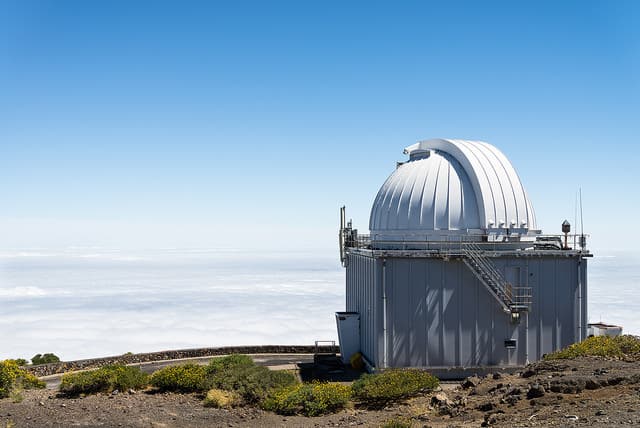Jacobus Kapteyn Telescope Gets New Lease on Life

The Jacobus Kapteyn Telescope (JKT), originally commissioned by the United Kingdom, Ireland and the Netherlands more than 30 years ago, and inactive for the last decade, has a new lease on life under remote control operation, made possible by an agreement between Southeastern Association for Research in Astronomy (SARA), a consortium of U.S. universities, including Texas A&M University-Commerce, and the Instituto de Astrofisica de Canaries (IAC). The reopening ceremony of this historic telescope in the Roque de los Muchachos Observatory on the Spanish island of La Palma took place on October 10, 2015, with the president of SARA, Terry Oswalt, and various other members of SARA's board in attendance as well as the director of the IAC, Rafael Rebolo, local authorities and scientists involved in the project.
The retrofit for remote operation completed by Astronomical Consultants and Equipment of Tucson, Arizona, extends the life of the telescope, which will be used for research, education and outreach. Traditional operations on the telescope's steep volcanic home formerly financed by the Isaac Newton Group ceased in 2003, and it wasn't until 2012 that its service was transferred to the IAC.
The current agreement with SARA, through international partnership, allows remote functionality by Internet connectivity across continents. During the dedication, Rebolo remarked, “The addition of the JKT to the network of telescopes operated by SARA allows an extraordinary temporal coverage in the Northern hemisphere, but also access by the IAC, in its own time, to a telescope in the South which will help us all to do better science from both hemispheres.” Meaning that IAC staff will not only be able to access their time on the JKT but also set up collaborative projects with other scientists in the consortium using other telescopes. The added benefit: “when the sun rises in La Palma, night comes to Arizona.”
The funding for the refurbishment of the SARA-JKT was made possible by a $500,000 grant to A&M-Commerce by the National Science Foundation.
“We’re very excited to have access to this premier facility at such an excellent location and longitude. Because the telescope is located just off the coast of Africa in the Canary Islands, observations will begin during our daytime, allowing us to incorporate the telescope into classroom instruction. In addition in conjunction with our telescope on Kitt Peak in Arizona, we’ll be able to obtain time-series observations of pulsating stars for up to 18 hours,” said Dr. Matt Wood, professor and department head of Physics and Astronomy.
For more information about the telescope visit: https://www.tamuc.edu/academics/colleges/scienceEngineeringAgriculture/departments/physicsAstronomy/news/nsf-grant-to-refurbish-canary-islands-telescope.aspx.


